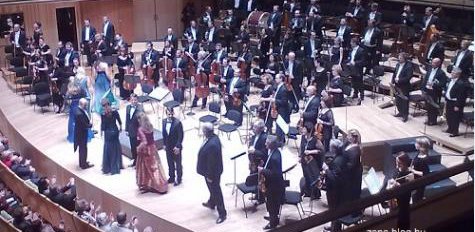Would poor Antonín Dvořák (1841-1904) have composed his operas if he had known that ungrateful subsequent generations would forget them all, only to rediscover them nearly 100 years after his death and play only one out of the ten worldwide?
This cannot be by chance, since you must be a very committed music lover to sit through Rusalka, which is quite long, and boring in terms of the plot.
A mere 2 or 3 sentences suffice to describe what is happening, while the listener concentrating on the story reaches the bottom stair of lethargy over three hours thanks to the mischievous and taunting wood sprites and Ježibaba’s magic spell “čury, mury, fuk” – the prince in love is finally given the fatal kiss and dies, and the unhappy water nymph sinks into the lake never to return.
There is no happy ending, but at least she suffered for it.
The seven-minute-long interval between the first and second movement is not enough to prevent the oedema caused by inactivity, during the second interval the few gaps in the auditorium grew in number, which is quite unusual for a Festival Orchestra event.
Whoever thinks it was a bad performance is mistaken.
It was not bad at all!
I was happy to hear the excellent Czech Philharmonic Choir for the second time within a few months, who sang Borodin’s greatest masterpiece in January on the very same stage as the embodiment of Polovtsians, but this time accompanied by outstanding soloists from the Czech Republic and Slovakia. In the first movement only some of the choir members sat on the stage, in the second, all of them, while in the third they sang in the background for a while, which sounded great.
As for the soloists, my own subjective ranking is the following: Jolana Fogašová, who played the role of both the witch Ježibaba AND the foreign lady who turned the head of the over-amorous prince. Her voice was beautiful, her play was fascinating.
We witnessed a concert-like performance of the opera, and I felt sorry for the poor singers, who contrary to the audience had to remain seated for three hours in an uncomfortable chair, where they could not even scratch their noses or ears, and did not have too much to sing either.
Jolana was not only present, she also acted, e.g. as a witch she looked at some people here and there, a target group I did not really want to belong to, even if it was only acting.
Mermaid and kitchen-help Michaela Kapustová tried to act as well, but she was better when singing.
The other soloists did not even attempt to act, they just sang their part, but very beautifully.
I especially liked Rusalka played by Pavla Vykopalová, who sang the hit “Song to the Moon” in a simple, pure and natural manner that Renée Fleming or Anna Netrebko will never be capable of anymore.
A projector displayed the Hungarian translation, from which I learned that Rusalka is not a person’s name or nickname, but means “mermaid”. I wonder whether it has anything to do with rusli (marinade) from an etymological point of view, a fish that similarly lives in water before being put into a can...
Another thought on language: Rusalka was written in Czech, and I saw a cabaret on a Slovak TV channel about 30 years ago, where the presenter spoke gibberish with Hungarian intonation, while the audience wiped their eyes and slapped their knees with exaggerated humour because they found our beautiful language so funny.
So far I haven’t really imagined a lover being cute by saying “svírá ti ústa tajemství, či navždy jazyk tvůj ztich” – but here it was alright.
Rusalka has been performed in various places in various interpretations.
I even found terrible arrangements, one for example resembled a horror story where the poor mermaid was deboned, and this meat-industry action was even illustrated in the piece with wailing shrieks, while another was a scary tale with Peter Mikuláš as the water goblin, just like here at the Palace of Arts.
Nonetheless, the greatest experience in this opera is music.
Music that not only accompanies acting as an empty bonding agent between better grand arias, but is also in the centre.
Iván Fischer was right when he opted for a concert-like performance.
Personally, I usually consider the Festival Orchestra’s performances too good to accompany an opera, but here it was not an accompaniment heard from the orchestra pit, it was a leading role.
It was a nice and elaborate work, where besides parts that were genuinely reminiscent of Dvořák, some Wagner, Tchaikovsky and Richard Strauss also appeared, the latter rather as if he had used the energy of Dvořák’s opera to write The Knight of the Rose, the presentation of the silver rose in particular.
Even if the story is not so cheerful, Rusalka is indeed a classical story, and a tale, especially if it is a Slavonic one, cannot be played without a harp.
My compliments to Ágnes Polónyi on her wonderful harp solos.
All in all: this music was an uplifting experience, not the first Dvořák piece I have heard from the Festival Orchestra, and if I remain lucky, soon I will be able to enjoy quite a lot of Dvořák’s music in Bruges with the BFO.
Or in Brugge.
Or in both places.
:-)


